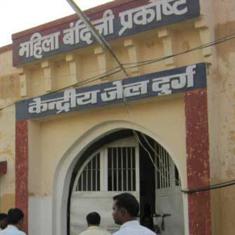While many perceive Atal Behari Vajpayee as among the least controversial of the political leaders who belong to the Bharatiya Janata Party and were part of its earlier avatar, the Bharatiya Jana Sangh, it would be incorrect to state that Vajpayee has never had a taste of controversy since he was initiated into public life while still a student by the senior leader of the Rashtriya Swayamsevak Sangh, Balasaheb Deoras, in the late-1930s.
What is not so well known is that a particular contentious episode has dogged the former Prime Minister of India for more than two decades. The controversy pertains to his role in the Quit India Movement launched by Mohandas Karamchand Gandhi against the country’s British rulers in 1942. Life sketches sponsored by the Sangh Parivar and the BJP have invariably included a reference to Vajpayee being jailed during the Movement, without providing any further details.
Vajpayee himself describes the incident rather blandly in his own article titled ‘The Sangh is my Soul’. The third paragraph of the article ends: ‘I also participated in the Quit India movement in 1942 and was jailed. I was then studying for my Intermediate examination. I was arrested from my native village Bateshwar in Agra district. I was then 16.’
The unstated, but clearly intended, implication of all the references to Vajpayee’s term in jail is that he indeed played a heroic role during the Quit India Movement, a major milestone in the history of India’s freedom movement. Interestingly, a hagiography of Vajpayee written by two of his long-standing associates (including one who was a Union minister) makes no mention whatsoever of the Bateshwar episode or the former Prime Minister’s role in the Movement.
In India under Atal Behari Vajpayee: The BJP Era, C.P. Thakur and Devendra P. Sharma (UBS Publishers, 1999) have devoted a full chapter to detailing Vajpayee’s career in politics. The chapter entitled ‘Gwalior to New Delhi: A Short Distance But a Long Journey’ goes into considerable detail about Vajpayee’s childhood, his family background, his early education and his rise in the Sangh Parivar and the BJP. The authors are notably silent on Vajpayee’s involvement, if any, in the freedom movement.
Since 1974, charges have been levelled from time to time by his political opponents that Vajpayee’s testimony before a magistrate in his native village of Bateshwar, near Agra in Uttar Pradesh, on September 1, 1942 was, in fact, responsible for at least one ‘freedom fighter’, Liladhar Bajpai, being sentenced to five years’ rigorous imprisonment.
It is ironic to recall that one of those who made this charge against him in 1989, the late P. Rangarajan Kumaramangalam, was later a prominent member of the BJP and Cabinet Minister in the second and third Vajpayee governments. Earlier, Kumaramangalam, as a Congress MP at that time, was a signatory to a letter by 52 MPs accusing Vajpayee of playing a ‘nefarious role’ in the Quit India Movement and suggesting that ‘he implicated a number of freedom fighters to save his own skin’. In fact, the letter even insisted that Vajpayee has signed a confessional statement that was ‘the only basis for sentencing a whole group of freedom fighters for long terms of imprisonment’.
On every occasion on which this charge has been raised since 1974 (when Blitz first published an article on the topic), Vajpayee, his party, and the Sangh Parivar have responded by dismissing the allegations as totally baseless and even threatening to sue those who made the accusations. The controversy, however, refused to die down. Ultimately, in early 1988, the facts of the case were brought to light by a detailed investigation by a team of journalists for Frontline magazine and were confirmed by Vajpayee himself.
As is often the case, the truth lies somewhere in-between the two extreme positions taken by the supporters of the accused and the accusers. While it is true that Vajpayee’s testimony was not used as evidence in court, it is also equally true that Vajpayee did sign a confessional statement absolving himself of any role in an incident that had taken place in September 1942 in which a government building at Bateshwar village had been damaged by a group opposed to British rule in India. In that statement, Vajpayee also named Liladhar Bajpai alias Kakua as one of those who led the mob that had damaged the building.
Clearly, therefore, while Vajpayee was not directly responsible for Liladhar Bajpai being sentenced to five years’ rigorous imprisonment, he was also by his own admission not an active participant in the Quit India Movement. That Vajpayee was arrested on the occasion was merely due to the fact that he, with his brother, was present among a crowd. In defence of his having named Liladhar Bajpai, Vajpayee has clarified that his confessional statement was recorded in Urdu, a language he cannot read, and it was not read out to him later.
However, Vajpayee did confirm (in an interview with Frontline editor N. Ram) that he had indeed signed the statement. Liladhar Bajpai himself contended that though the confessional statement signed by Vajpayee was not used as evidence in court, it was a major factor in his being sentenced since the Vajpayee brothers were, unlike the rest of the village, educated and hence considered more dependable in their testimony by the police and the court. He also suggests that the case of the prosecution very closely mirrored the testimony of the Vajpayee brothers.
This is indeed a relatively unknown aspect of Vajpayee’s otherwise much-publicised political career.
Extracted from Divided We Stand: India in a Time of Coalitions, Sage Publication, 2007. Used with the permission of the authors.
What exactly was Vajpayee's role in the Quit India movement?
As the former prime minister is awarded the Bharat Ratna, a book explores a relatively unknown aspect of his otherwise much-publicised political career.










